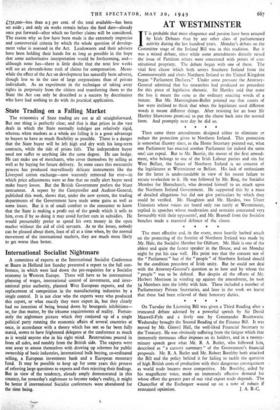State Trading on a Falling Market
The economics of State trading are not at all straightforward. But one thing is perfectly dear, and that is that prices in the vast deals in which the State normally indulges are relatively rigid, whereas when markots as a whole are falling it is a great advantage to buyers to have as much flexibility as possible. There is a danger that the State buyer will be left high and dry with his long-term contracts, while the tide of prices falls. The independent buyer need not suffer to anything like the same degree. He can hedge. He can make use of merchants, who cover themselves by selling as well as by buying for future delivery. In some cases this mercantile process has produced marvellously delicate instruments like the Liverpool cotton exchange—now wantonly removed for ever—in which price adjustments were so fine that no really alert buyer need make heavy Josses. But the British Government prefers the blunt instrument. A report by the Comptroller and Auditor-General, published this week, shows that, under the new system, the trading departments of the Government have made some gains as well as some losses. But it is of small comfort to the consumer to know that the State is making a profit out of the goods which it sells to him, even if by so doing it may avoid further cuts in subsidies. He would presumably prefer to spend his own money in the open market without the aid of civil servants. As to the losses, nobody can be pleased about them, least of all at a time when, by the normal movement of the international markets, they are much more likely to get worse than better.










































 Previous page
Previous page